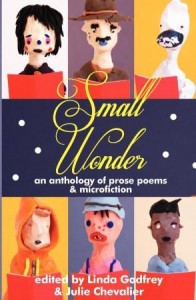 1. What inspired you to write the prose poem/microfiction which is published in Small Wonder?
1. What inspired you to write the prose poem/microfiction which is published in Small Wonder?
These were extracted from my unpublished PhD novella ‘Harriet Chandler’. The novella is a hybrid text of prose poem and prose fiction, but also in terms of content: art, ecocriticsm, fictional biography etc. I am very conscious of ecocriticism, or an ecological point of view in literature, because of the crises in climate and environment. Ecocriticism is a rising genre in the twenty-first century. I wanted to try my hand at it in ‘Slippery as a Fish’. I also adore the prose poem for its intensity and brevity, for its narrative and poetic language. ‘Travelling (East–West)’ is my attempt to make a prose poem from my old travel diary. The final piece ‘Australia: Terra Omnium’ is specifically related to Murray Bail’s Australian novel, Holden’s Performance. (Harriet Chandler is a minor character in that novel.) Bail lovingly critiques the white, Anglo-Australian male, and ends the novel in a kind of list that foregrounds Holden’s mechanical being. I wanted to end my novella in a list that celebrated Australia’s plurality and diversity.
2. Tell us about that process. (Do you start sparse and widen out, or do you write down every possible association and cut back? Do you research the subject matter you are writing about? Is it pure intuition?) Take us through an example if you want.
I am a slow writer, like Bail, and I draft and re-draft a lot. I also work by imitation (intertextually). I love working with language over narrative/plot. That’s why I love the short forms. I do research.
3. What advice do you have for other writers ? about the first or last line? About how to choose the title? Do you follow any rules?
If you get the right first line, you are often away on a short piece. Listen to your voice, to what you are telling yourself about something. Generally speaking, short pieces work organically, coming to their own ‘natural’ end. When you have a larger piece of work, you need to work from the top down, imposing structure from above, otherwise the work gets out of hand. I love titles. Often there’s one somewhere in the piece. But you may have to choose one that is indicative of the piece, while also enticing, so that the reader enters the work desirously.
4. Who or what inspires your writing?
My pieces for Spineless Wonders have been inspired by Murray Bail, and the prose poem as a form and writers of it, but also the need to write ecocritically, contributing, through art, to … saving the planet! I love the short forms: the novella, the prose poem. They work via intensity and resonance.
5. Tell us what do you do if you haven’t written anything in a while and you want to get started writing again? Could you share your favourite writing exercise with our readers?
I read (not only fiction, poetry and creative nonfiction, but, say, New Scientist). Go to the theatre (even watch television). Listen to songs. Exercising, getting the body moving, is a great way to get inspiration. If you’re working steadily and consistently, which you should do, you are chock full of ideas, because one piece feeds another. Also, I am constantly on the look out for publishing opportunities, like Spineless Wonders, because they inspire you to think about … well, both topics/subject matter and genres/forms for work. I keep a hand-written journal, where I put down ideas, or actually start stories. Usually I write because I want to understand something, explain it to myself. Never throw anything away: there’s usually something, even a phrase, that can morph into a larger work. As well, sometimes it takes years to get the right angle on a piece, or find the right publication for it. Writing is hard work, but it’s also fun, a space to play, otherwise we’d never do it!
